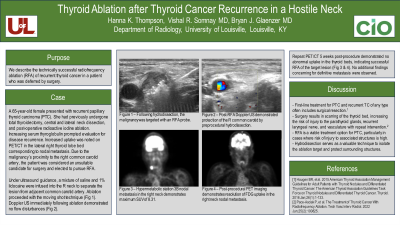Ablative Therapy
(31) Thyroid Ablation after Thyroid Cancer Recurrence in a Hostile Neck
Saturday, September 23, 2023
6:00 PM - 7:30 PM East Coast USA Time

Henderson Jones, MDJD – Radiology Resident, University of Louisville; Bryan Glaenzer, MD – Interventional Radiology Attending, Radiology, University of Louisville; Vishal R. Somnay, MD - Radiology Resident, University of Louisville
Purpose: We describe the technically successful radiofrequency ablation (RFA) of recurrent thyroid cancer in a patient who was deferred by surgery and review current literature surrounding RFA as a therapy for thyroid cancer.
Material and Methods: A 65-year-old female presented with recurrent papillary thyroid carcinoma. She had previously undergone total thyroidectomy, central and lateral neck dissection, and post-operative radioactive iodine ablation. Increasing serum thyroglobulin prompted evaluation for disease recurrence. Increased uptake was noted on PET/CT in the lateral R thyroid bed. Due to close proximity of the malignancy to the R common carotid artery, the patient was considered an unsuitable candidate for surgery and elected to pursue RFA.
Under ultrasound guidance, a mixture of saline and 1% lidocaine were infused into the R neck in an effort to separate the R lobe lesion from the common carotid. Following successful hydrodissection, ablation proceeded with the moving shot technique. No injury to the R common carotid was observed on grayscale during the procedure, and Doppler US immediately following ablation demonstrated no flow disturbances.
Results: Repeat PET/CT 5 weeks post-procedure demonstrated no abnormal uptake in the thyroid beds, indicating successful RFA of the target lesion. No additional findings concerning for definitive metastasis were observed.
Conclusions: RFA is a viable treatment option for thyroid carcinoma, particularly in cases where surgery carries a high risk of injury to associated vasculature. Hydrodissection serves as a valuable technique to isolate the ablation target and protect surrounding structures.
Material and Methods: A 65-year-old female presented with recurrent papillary thyroid carcinoma. She had previously undergone total thyroidectomy, central and lateral neck dissection, and post-operative radioactive iodine ablation. Increasing serum thyroglobulin prompted evaluation for disease recurrence. Increased uptake was noted on PET/CT in the lateral R thyroid bed. Due to close proximity of the malignancy to the R common carotid artery, the patient was considered an unsuitable candidate for surgery and elected to pursue RFA.
Under ultrasound guidance, a mixture of saline and 1% lidocaine were infused into the R neck in an effort to separate the R lobe lesion from the common carotid. Following successful hydrodissection, ablation proceeded with the moving shot technique. No injury to the R common carotid was observed on grayscale during the procedure, and Doppler US immediately following ablation demonstrated no flow disturbances.
Results: Repeat PET/CT 5 weeks post-procedure demonstrated no abnormal uptake in the thyroid beds, indicating successful RFA of the target lesion. No additional findings concerning for definitive metastasis were observed.
Conclusions: RFA is a viable treatment option for thyroid carcinoma, particularly in cases where surgery carries a high risk of injury to associated vasculature. Hydrodissection serves as a valuable technique to isolate the ablation target and protect surrounding structures.
